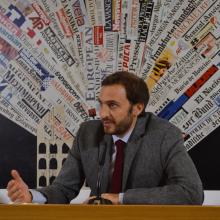curia

Image via REUTERS / Alberto Pizzoli / Pool / RNS
A year after he delivered a blistering diagnosis of 15 “diseases” plaguing the Roman Curia, including “spiritual Alzheimer’s,” Pope Francis on Dec. 21 listed a 12-point “catalog of needed virtues” that the bishops and cardinals who run the Holy See should seek to follow.

Emiliano Fittipaldi. Image via Rosie Scammell / RNS
An Italian investigative journalist on Nov. 17 spoke out against what he called a “medieval” Vatican law that might result in a jail sentence of up to eight years for publishing confidential Holy See documents.
Emiliano Fittipaldi, whose new book Avarice reveals the struggle for financial reform at the Vatican, is under investigation for publishing secret documents leaked from the Holy See. A fellow Italian journalist, Gianluigi Nuzzi, is also being investigated for revelations made in his book, Merchants in the Temple.
While describing the investigation as “a terrible moment,” Fittipaldi remained defiant:
“From my point of view they are crazy charges, in the sense that in no democratic state, in no Western democracy, are there such restrictive laws on press freedom and expression.”

Image via Alessandro Bianchi / REUTERS / RNS
Pope Francis on Nov. 8 broke his silence over the leaking of confidential Vatican documents, which he described as a “deplorable act” that will not stand in the way of his ambitious reform agenda.
Speaking to followers in St. Peter’s Square, the pontiff criticized revelations made in two books published last week that explore Francis’ efforts to overhaul financial mismanagement within the Vatican walls.
“Stealing those documents was a crime. It’s a deplorable act that does not help,” the pope said, adding that the leaked information was based on a study he had personally requested.
Pope Francis and his council of eight cardinals are unlikely to complete a radical shakeup of the Holy See’s administration, or Curia, before 2015, the Vatican said Tuesday.
Francis joined the council’s discussions in between events on an intense appointment schedule that included an audience with King Juan Carlos of Spain after the historic double canonizations of Popes John Paul II and John XXIII on Sunday.
For Catholics—and many others—what happens in Rome doesn’t stay in Rome. The seating of a new pope has the power to affect believers across the globe, in ways direct, indirect, and unpredictable. And when a surprising sea change occurs in a hide-bound, steeped-in-tradition place like the Vatican—the unexpected resignation of a pope, the selection of a Jesuit from the Americas as his replacement, and the powerful symbolism of a new leader who literally stoops to wash a Muslim woman’s feet—people of faith of all traditions sit up and take notice.
In these early days of Francis’ papacy, we asked three prominent Catholic thinkers and leaders to help us understand what it all might mean. How will the spirit of reform that has marked Pope Francis’ first few months in office affect the worldwide church? Will change at the top trickle down to parishes and neighborhoods here in the United States and elsewhere? And what will Francis’ leadership mean not only for Catholics, but for all people of faith engaged in the work of making justice and building peace? —The Editors
CATHOLICS AROUND THE WORLD are transfixed by Pope Francis. We love his simplicity of life, his humble faith, his welcoming attitude to all, and his way of being Christian in the contemporary world that takes its bearings from the poor. Lace and gilt are no longer fashion statements at the Vatican. From his small apartment, the pope speaks bluntly about worrying less about rules and more about love. An utterly refreshing breeze blows through the Catholic Church.
But what does it really mean for Catholics today? The church still reels with the moral and spiritual damage done by members of the clergy as perpetrators or accomplices in the sex abuse scandals, from fiscal mismanagement, and from institutional infighting. Does Pope Francis change that? And what does the new pope signify for the young, for women, and for the many issues that vex the church’s engagement in today’s world?
Pope Francis has won widespread acclaim thus far in his nascent papacy with popular gestures like washing the feet of juveniles during Holy Week and refusing many papal perks. But now comes the hard part of his new job: reforming the Vatican.
The Roman Curia, as the central administration of the Catholic Church is known, has been riven by scandals and allegations of infighting and careerism, which helped undermine Pope Emeritus Benedict XVI’s reign and reportedly pushed him to resign.
The dysfunction was so bad that reforming the Curia became a rallying cry for many cardinals at the conclave that elected Francis. But will he deliver on the promise of reform?
In his first general audience since his election to the papacy, Pope Francis on Wednesday urged Catholics to leave their comfort zone to search for “lost sheep.”
As the Catholic Church prepares for Easter and celebrates the rites of Holy Week, Francis told around 20,000 people in St. Peter’s Square to avoid “a tired and routine way of living the faith,” and resist “the temptation to withdraw into pre-established patterns that end up closing our horizon” to God.
“We must not be content to remain in the enclosure of the 99 sheep; we have to step outside, to search for the lost sheep,” he added, referring to a parable of Jesus.
![Cardinal George Pell in Rome, 2007. Photo courtesy of Gavin Scott [Public domain], from Wikimedia Commons.](https://sojo.net/sites/default/files/styles/medium_square/public/blog/Cardinal_George_Pell.jpg?itok=X7KBXs_J)


